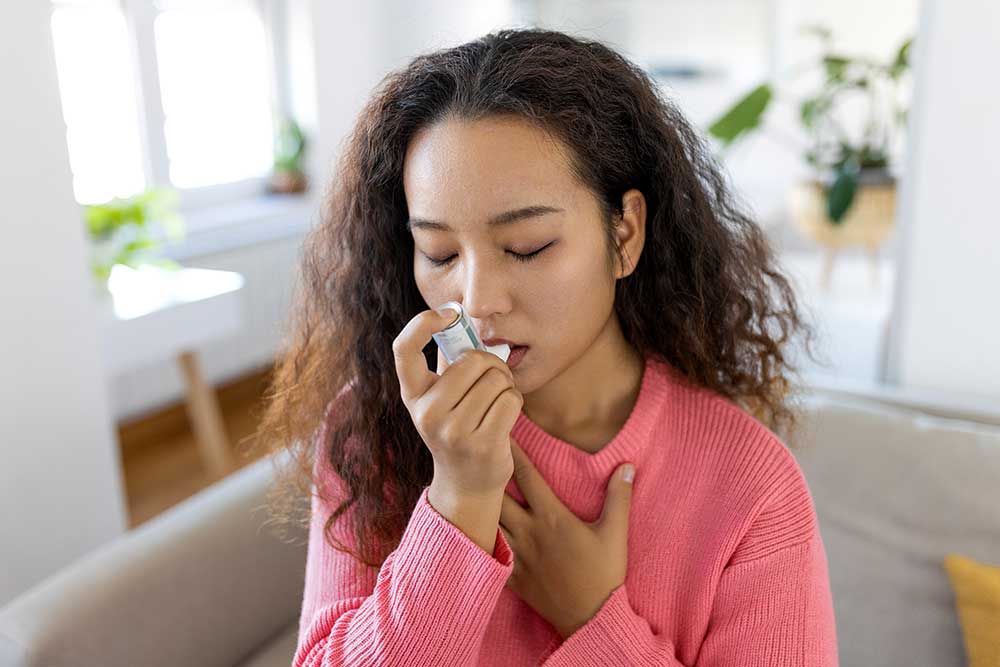Wintertime means many things to many people. Holidays, get-togethers, trips, and cozy days indoors can make winter enjoyable. For many people with asthma, however, winter can be a time of worse symptoms and more frequent asthma attacks.
The good news is that the experienced team at Thibodaux Regional Urgent Care is ready to provide convenient, rapid treatment for your asthma symptoms.
Does Asthma Get Worse in the Winter?
Asthma is often more of a problem during the winter months. There are several reasons for this:
- Cold Weather. For someone with asthma, cold air can cause constriction of the muscles around the airways and swelling of the tissues lining the airways. The result is the worsening of asthma symptoms.
- Drier Air. Dry air—both indoors and outdoors—can irritate your airways.
- Cold and Flu Season. Colds and the flu are more widespread during the winter months. These viruses can trigger asthma symptoms in some people, including children.
- Allergens Inside. When it’s cold out, we tend to spend more time indoors. This can increase exposure to many common indoor allergens, including dust mites and pet dander.
Symptoms of Winter Asthma
The symptoms of asthma in the winter months are much the same as at any other time. Symptoms may include:
- Wheezing.
- Shortness of breath.
- Tightness in your chest.
- Coughing.
- Difficulty sleeping due to shortness of breath or coughing.
Should I Get Treatment for Asthma?
If you or your child has asthma, knowing when to get help is essential. Watch for these signs that your asthma is worsening and requires medical attention:
- More frequent use of your rescue inhaler to relieve asthma symptoms.
- Your rescue inhaler isn’t clearing up your symptoms.
- Your normal activities are disrupted or prevented by asthma symptoms.
- You’re having a harder time breathing. If you have a peak flow meter, this can confirm reduced lung function.
If your asthma is bothersome or worsening, don’t hesitate to seek immediate help in urgent care. Getting medical treatment for an asthma attack early on is vital.
You should seek help in an emergency room if you experience life-threatening symptoms:
- Profound difficulty breathing in or out.
- A gray or blue tinge to your lips, face, or fingernails.
- Pale, cold, or moist skin.
- A rapid heart rate.
- Confusion.
Winter Asthma Treatment in Urgent Care
Urgent care is a great choice for bothersome asthma symptoms or exacerbations. At Thibodaux Regional Urgent Care, our experienced providers will promptly evaluate your symptoms, assess your breathing, and start the treatment you need to get you the relief you need. If your asthma was triggered by an illness like a cold, the flu, or COVID-19, our clinicians can also diagnose and treat these illnesses and help you on your path to recovery. Our onsite labs help our providers find a diagnosis quickly to get you the help you need.
Preventing Winter Asthma
Asthma in winter can be troublesome, but there are some things you can do to prevent flare-ups.
- Wash Your Hands. This tip may sound cliched, but it really is one of the most effective ways to prevent a cold, flu, or other winter illnesses that can worsen your asthma.
- Stay Hydrated. Decaffeinated liquids like broth, water, and herbal tea can help keep your body’s tissues—including your airways—healthy and hydrated.
- Wear a Scarf. Wearing a scarf or face mask that covers your mouth and nose can warm up frosty outside air and help prevent asthma symptoms. Breathing through your nose can also be helpful.
- Use a Humidifier. Using a cool-mist humidifier inside your home helps prevent irritation from dry air. Keep the humidifier clean to prevent mold growth.
- Carry Your Inhaler. Ensure you take your rescue inhaler wherever you go in case your symptoms are triggered while you’re away from home.
- Use Your Maintenance Inhaler. If you’ve been prescribed a maintenance inhaler, ensure you use it as directed to prevent a flare-up of asthma symptoms.
If you’re experiencing the frustration of asthma this winter, don’t hesitate to visit Thibodaux Regional Urgent Care for convenient, excellent asthma treatment.




